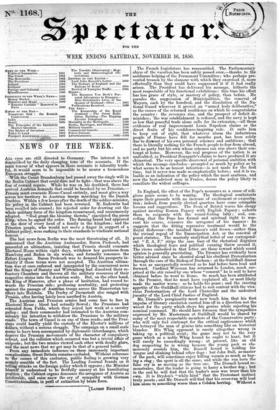The French Legislature has reassembled. The Parliamentary abyss of the
vacation has been safely passed over,—thanks .to the assiduous helping of the Permanent Committee ; who perhaps pre- vented treason by the clamour with which they exorcised it, more effectually than they could have suppressed it if it had really arisen. The President has delivered his message, hitherto the most respectable of his functional exhibitions: this time his effort has less grace of style, or mastery of policy, than before. He parades the suppression of Municipalities, the removal of Mayors, each by the hundred, and the dissolution of the. Na- tional Guard wherever it proved an "armed body deliberative," as the causes of the returned confidence on which he congratulates the country : the .revenues rise, and the prospect of deficit di- minishes; the war establishment is reduced, and the navy is kept so low that peaceful trade alone calls for its extension,—all these evidences of real improvement Louis Napoleon claims as the direct fruits of his confidence-inspiring rule. It suits him to keep out of sight, that whatever alarm the industrious people of France have felt for months past, has been solely due to distrust of his own personal schemes and ambitions; that there is literally nothing for the French people to fear from abroad, and no party but his own whose schemes can rise above their con- tempt at home. However, the. real progress of the nation is as undoubted; 119 President Bonaparte's claims to have produced it are chimerical. The very specific disavowal of personal ambition with which the message concludes—prompted as much by policy as by -what seems to be an honest intention—is not made for the first time, but it never was made so emphatically before ; and it is va- luable as an indication of the policy which the most cautious, and now the best-advised man in mince, deems the policy likely to conciliate the widest suffrages.


























